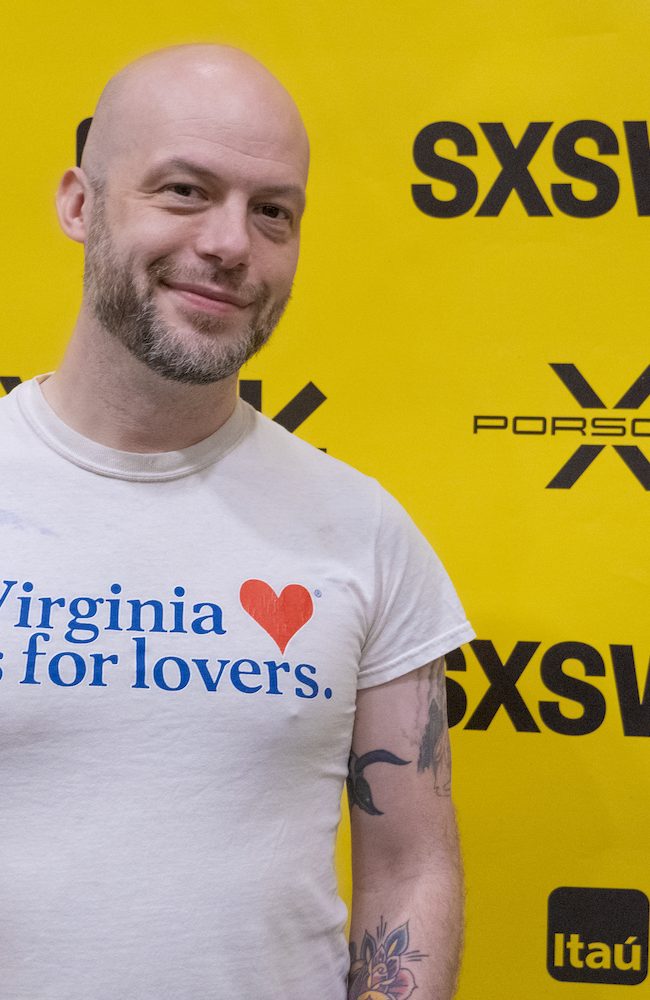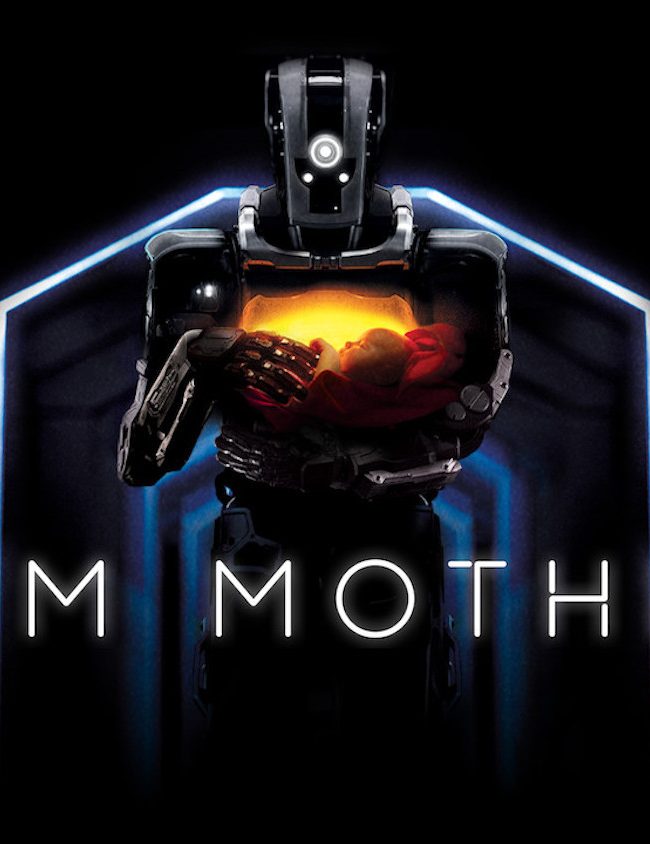A Conversation with Jenn Wexler & Sean Redlitz (THE SACRIFICE GAME)

Xmas sucks when you’ve been abandoned by your family. I can imagine being in boarding school already feels like being abandoned by your family. The Sacrifice Game finds Samantha (Madison Baines) stuck at Blackvale Academy when her stepfather gives her a last-minute holiday emancipation. Joining her for the unplanned festival gathering are the school’s least popular girl, Clara (Georgia Acken), a young teacher who knows a bit too much about the school’s questionable history (Chloë Levine), the cook, and her lover. Apparently, the wife and the thief did not RSVP. Actually, a group of thieves (murdering thieves) shows up to twist the coming-of-age comedy into a home-invasion plot. Their mastermind Maise (Olivia Welch), is a Blackvale Alum who has plans to summon a demon she discovered in her pre-graduate explorations.
Now streaming on Shudder, The Sacrifice Game is the second feature from writer-director Jenn Wexler (The Ranger, 2018), this time with co-writer Sean Redlitz on board. [Chloe Levine played the female hero/target of The Ranger]. I had a chance to sit down with Wexler and Redlitz shortly after the film’s streaming premiere to discuss Christmas memories and demons.
Hammer to Nail: I really enjoyed the film. It was vicious. I love a good Christmas film, especially a Christmas film which is surprising. So what got you excited about doing a Christmas film?
Jenn Wexler : Well, we’re big fans of Christmas horror movies specifically. It’s always fun when you play with childlike imagery in horror and you take something that’s supposed to be sweet and make it really dark. We all have memories tied up around Christmas, and obviously, Christmas is a holiday about family and that can be very warm for some people and it can also be very cold, and there’s lots of feelings about loneliness that come up in terms of that holiday as well. Christmas horror like Black Christmas and Silent Night, Deadly Night and movies like that, we thought it would be fun.
Sean Redlitz: It’s A Wonderful Knife, Krampus. Yeah, we love the Christmas… Christmas is like the second-biggest horror holiday after Halloween, I think. And there’s so many more movies that are now staking out every holiday on the calendar. Thanksgiving just came out anyway, we want the whole calendar to be horror, but we wanted to make our mark and do our version of Christmas horror. And like Jenn says, Christmas is a time of family and that can be wonderful and that can be painful. It depends on your relationships with the family and found family versus maybe the family that you started with. So all those themes just lent themselves to the story we wanted to tell, so it just seemed like the perfect match.
HtN: Yeah, it was really interesting because you’re dealing with two kids who have basically, before you know what the deal is, you just assume that both kids have been abandoned by their family, and so they’re having to create a new family together. And then you’ve got another sort of family unit that invades. They’ve created their own sort of family, who’s in charge, who’s the father figure of that group?
JW: We wanted to explore that toxic family dynamic as well through the gang.
HtN: And Christmas time is the time that brings out the toxic in the family, that’s for sure. What is your worst Christmas memory?
JW: Well, I didn’t get to celebrate Christmas as a kid because I’m Jewish, but I love Christmas, so I would stay up all night watching out my window to see if Santa Claus would land on the house across the street because I knew he wasn’t coming to mine, and I just tried to stay up watching. And I’d always fall asleep, but I look back at that and I was just like, “Wow, that was so sad.” I just wanted Santa to be real so much, and it was okay that he didn’t like me, but I just wanted him to really exist.
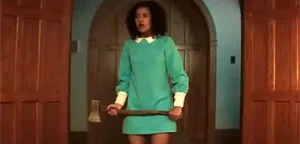
A still from THE SACRIFICE GAME
SR: I also – Jewish – grew up, but Christmas is so secularized in America. It’s just part of the culture. We had a Christmas tree and a menorah because who doesn’t want a Christmas tree? They’re fun and festive. Honestly, the worst Christmas is everyone that I’ve been to since the one I was invited to a Feast of Seven Fishes because that was so good, and I haven’t had a meal like that since then. Every Christmas I’m like, “”I need to meet somebody who’s going to invite me to their family’s big Christmas dinner because there’s nothing like it.”
HtN: Yeah, I grew up Eastern Orthodox, so our Christmas was supposed to be a week later, two weeks later, so all the wrapping paper was on sale, and you’re always getting the hand-me-down presents. That was great.
JW : How did you feel during the Christmas other people were celebrating?
HtN: I would go to their houses and they’d be like, “Look at my new toy. What did you get?” And I’d be like, “I got nothing. I’ve got to wait.” So tell me about how you two met and how you worked together on the script.
JW: So we both used to work for a horror TV channel called Fearnet that no longer exists, and we’re married now, but at the time, we started dating. And so within our relationship, it’s common for us to bounce ideas off of each other. And I wrote the first draft of this script in 2013, and then I put it aside for a while and then I dove back into it in 2018. I was just bouncing ideas off of Sean, and then Sean came up with an idea that totally unlocked the movie for me, unlocked the story, and I was like, “Hey, do you want to be more of a part of this?”
SR: Jenn is the one with the trained screenwriter background, went to film school, learned all that. I came up through the marketing/PR/journalism side of entertainment, working at SyFy, working at Bravo, working at Fearnet together there. So I was always content adjacent, entertainment adjacent, and Jenn was right there in the heart of it. So by being together in the relationship, and especially being in the same house during a lot of the Covid period and really not having that much to do, it went from me just being a creative sounding board for Jenn for some ideas she had, to being more of a direct hands-on collaborator. So I’m really lucky to have been invited into that process and that Jenn resonated with the contributions that I was making.
HtN: Jenn, when you set it aside for five years and came back, what was the thing that made you come back to it? How did you know that this was a story that you still needed to tell?
JW: Well, it’s so personal to me because I was a lonely teen girl, and so I knew that I wanted to make it right. And at the time, in 2013, I was just starting to learn how to make movies. I started working for this production company, Glass Eye Pix, and I started producing for them. And I just knew, I was like, “This is something that’s very special to me, but I have to do it when the conditions are right and when I have more experience and I know how to really approach this.” So put it aside, produced several movies for that company. I directed my first feature of The Ranger, and then after that I was, “Okay, I know how to do this now.”
HtN: I’m curious about the mythology and where you came up with the details of how the curse worked and what you had to do to unlock it because I love that background stuff.
JW: I was researching demons in The Lesser Key of Solomon and just doing a lot of just online research about how you would summon a demon. And it all seemed to be, if you want to summon a demon, it’s very complicated. It’s a very complicated routine.
HtN: Well, you don’t want to do it accidentally, so that’s important.
JW: Exactly, exactly. And that’s why we created our own. We use traits from those kinds of demons, but I didn’t want to actually use a real demon because I was scared, what if we accidentally summoned a real demon? But I really liked the way that they describe those demons. So we stole certain traits like she’s a trickster demon and she’s able to cloud minds to keep her from being seen while she’s stuck at this school. And that was really fun to dive into.
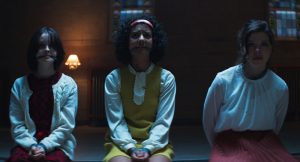
A still from THE SACRIFICE GAME
And then, so in terms of the ritual, A Dark Song is a great example of how complicated these rituals are. So we started thinking about, well, what makes sense for us? And we wanted it to be, I mean, slight spoiler that we’re going into now, but that she has to lure. It’s a game of, what’s it called when you have to find things?
SR: Scavenger?
JW:Yeah, it’s a scavenger hunt for the gang because they have to find these symbols on people’s bodies and then they have to collect them and then bring them to this school.
SR: And we developed a whole history and backstory, what happened way back when, how the demon came to be, where and what the demon is in the movie, what that book represents. But we decided we didn’t want to put too much of that in the movie.
HtN: Yes, you the audience to feel like you know and there’s a lore there and you can tease it out through clues.
SR: Right, but we didn’t want to stop and have just a whole flashback section or a big info dump of lore. So it’s there, I think, in bits and pieces if you want to put it together for yourself.
— SPOILERS AHEAD —
HtN:Yeah, I love that. I mean, it just seems like they’re not all going to know the answer anyway, so they’re searching as much as the audience, so we don’t want to have more information than them. The actress that has to play the demon child, that’s a big ask because it’s two completely different characters. There’s the first 45 minutes and the second 45 minutes, and I mean, it was very surprising, so I love that. But I was very surprised by her performance and how different she was. How did you find her and how did you coach her?
JW: It was her first feature. Georgia Acken who plays Clara. It was her first feature. And we feel so honored that we get to show off her incredible talent in her first feature, and we claimed that through the “introducing” card in the beginning of the movie.
HtN: I love that.
JW: We did auditions with lots of teen girls around Canada, and that’s how we found Georgia as well as Madison (Baines), who plays Samantha. Madison, I felt was very vulnerable in her audition and I was like, “That’s great. I care about you so much just from the energy, this vulnerability you’re bringing, and I can’t wait to expand on that.” And then with Georgia, she just got the character. Something I was really excited about in terms of the writing of it, was playing with the idea of she’s a demon, but she’s also been here for so long that she’s also become a teenage girl. And I think that really resonated with Georgia and she just instinctively understood that. It’s really fun. If somebody goes back and rewatches the movie, I think that if you keep an eye out for her, I think you can track what she’s doing the whole time. And I have a lot of fun watching her, knowing her journey.
HtN: It’s definitely a movie that’s going to give back to the audience if they decide to watch it a second time, I think. I mean, it’s got a big enough twist that it’s like, “Oh, I really wasn’t paying attention to what I was supposed to be paying attention to.”
SR: And it’s probably worth mentioning that although Madison is a bit older than a teenager, she plays teenager very well. Madison plays Samantha. Georgia was 14 when we started production, from 15 on in production. So she really is the age that the characters are representing. And it’s rare to find somebody who can hold their own with a cast as strong as this, with as much experience as they have as this, at that age. And I mean, not just hold their own, but essentially be the driving force in that final third of the movie in such a powerful way.
JW: I also just want to bring up, and this is something we haven’t talked about too much before, that her father, who was on set with us, happens to also be a mythology academic, a genre mythology academic. And he became our Latin consultant and was working with the actors to get them to pronounce all the Latin correctly. And he wrote some of the Latin for the movie as well.
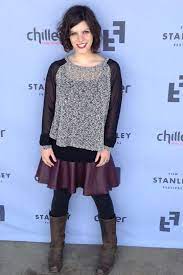
Filmmaker Jenn Wexler
— MAJOR SPOILERS —
HtN: I was very happy when everybody got killed, our band of killers, because I was worried that as soon as we had the twist, I was like, “Oh, wait, now are we supposed to be cheering for Maisie and her group of people who I just watched kill a bunch of people I liked” So I think your film is a lot about guilt. They talk about guilt in it and the sacrifice the guilty. So it was nice to see that carry over. I assume that was a direct decision that no one was going to live. Why did they have to die and why did they have to die when they died?
JW: Well, we always were excited for the climax to be the sacrifice game. these people have been going around murdering, high on their own sense of power, believing that they’re going to get what they want, being so sure of themselves that they know what this higher force wants, and then they discover, actually, they have no clue — because how could they — because none of us know what a higher force wants. They’re operating at a different wavelength than us mere humans. So that was always how it was going to end. Around this table. And we get to see them now sacrificing themselves.
SR: There are a lot of people that die in this movie, and there are a lot of people that lead to other people dying. Clara is in a position where she really doesn’t have a choice. She didn’t ask to be put in this box. She didn’t ask to be put in this body and there she was. So she’s doing what she’s doing out of necessity and survival. You can’t really fault that. The gang is doing what they’re doing out selfishness. And Samantha does what she does out of selflessness. She doesn’t have to do it, and she chooses to do it because she feels something for somebody. And that charts the moral universe of the movie.
HtN Even though Clara has to do it though, she still enjoys it.
SR: She enjoys it because she’s been working at it for a long time. If you’ve ever had a project that you’ve been working on for months or months or centuries or centuries, when it finally all comes together, it feels really good.
HtN: Well, in this case, it’s at least seven years because that was when Maisie was at the school. So we’d know that she planted the seeds back then and she’s been waiting.
SR: And Maisie might not have even been the first. There might’ve been other attempts before Maisie.
JW: Yeah, and I mean, it was hard to get this movie made. And so, I feel like I was pouring that energy, that angst into the character. Clara is slowly waiting. She’s planning this. It’s moving very, very slowly, but she has to be patient.
— COULDN’T GET MORE SPOILERY —

Filmmaker Sean Redlitz
HtN: Well, I love the ending. I love the two of them together. It gets me really excited to see what happens with their relationship now, now that Clara can actually be a young girl a little bit and enjoy life and see the world. And Samantha has somebody and we see what she’s willing to do for that person. I mean, I made them a couple in my mind because that’s what I wanted, but I want to see where they go and what they do. Their friendship emerges out of blood. I don’t know what their next step is going to be.
SR: Bears, it sounds like you’re asking for a sequel.
HtN: I’m always asking for a sequel, but especially when it’s open-ended, but you’ve left a lot on the table for these characters to… They’re just starting to be able to experience the next stage of their life. That’s what being 14 is, really.
JW:I was really interested in it feeling like the very beginning of a best friendship, when you first recognize that — I want to be your best friend. I have a friend crush on you, maybe it becomes something more. But I feel like that feeling is like falling in love.
SR: The intensity of feelings at those age are like none others. So it’s hard to even draw the lines between friendship, love, attraction, where they all start and go. So we wanted to leave that relationship and where it goes from here open in the minds of the viewers because it really could be anywhere.
The Sacrifice Game premiered at Fantasia International Film Festival and is streaming now on Shudder.
– Bears Rebecca Fonté (@BearsFonte)








